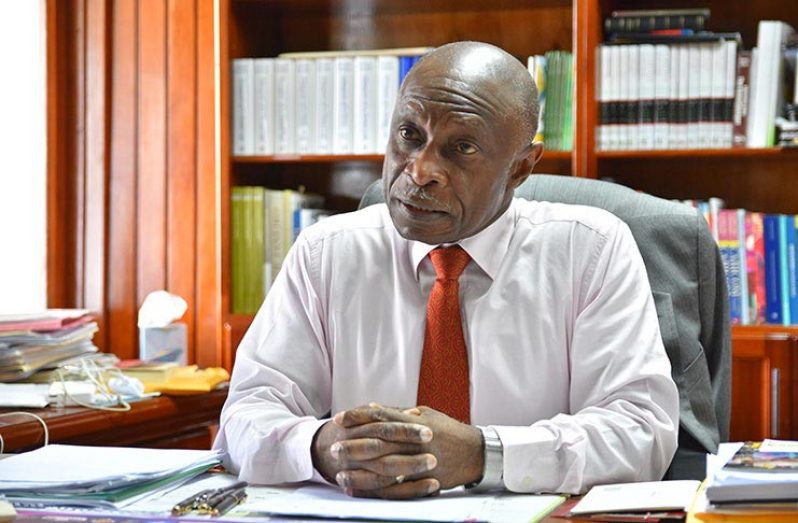…as hearing on jurisdiction opens today
TODAY, Guyana, in a historic move, will appear before the International Court of Justice (ICJ) as it makes a strong case for the world court to adjudicate on the Arbitral Award of October 3, 1899 in the case, Guyana v. Venezuela.

Guyana is seeking to obtain a final and binding judgment that the 1899 Arbitral Award, which established the location of the land boundary between then British Guiana and Venezuela, remains valid, and that the Essequibo region belongs to Guyana, and not Venezuela. However, the ICJ must first established jurisdiction, and today (June 30) arguments will commence in that regard.
Agent of the Cooperative Republic of Guyana, Carl Greenidge, in a statement on Monday said the hearing before the ICJ is a significant milestone. “Guyana has long valued the opportunity of a judicial settlement of Venezuela’s outrageous claim to nearly three-quarters of Guyana and welcomed the decision of the Secretary-General of the United Nations in 2018 (acting under the 1966 Geneva Agreement) that the International Court of Justice shall be the forum of settlement of the controversy,” Greenidge said.
He explained that today’s hearing is for the sole purpose of addressing the question of the Court’s jurisdiction; that is, whether the Court has the authority to resolve the controversy between Guyana and Venezuela over the validity of the boundary that was permanently established between them since 1899.
Guyana, Greenidge said, is of the firm belief that the ICJ has jurisdiction to rule on the validity and permanence of that boundary. Though contending that the ICJ lacks jurisdiction to adjudicate in the matter, Venezuela failed to submit its Counter-Memorial on Jurisdiction – in response to Guyana’s Memorial. In recent days, Venezuela, in maintaining its position, has made it clear that it will not participate in the hearing.
“Regrettably, Venezuela has decided to boycott the hearing. However, this will not prevent the Court from hearing Guyana’s arguments or going forward with the case,” Greenidge stated.
WILL BE LIVE-STREAMED
The hearing will be done via video conference, at the instance of the Court, and will be streamed live in light of the COVID-19 pandemic. This virtuous move by the Court is intended to keep the wheels of justice turning notwithstanding the spread of the COVID-19, Greenidge noted.
The country anticipates that the ICJ will issue its decision on the jurisdictional question before the end of the year. “Should it rule in Guyana’s favour, as we expect, it will then proceed to the next phase of the case, and ultimately decide the question that Guyana has put before it: Whether the 1899 boundary that separates the two States, is a lawful and permanent boundary, such that the Essequibo region is confirmed as an integral part of Guyana’s territory for all time,” Greenidge explained. He said the country will continue to do everything in its power to achieve that result, and is confident that the final outcome will be what all Guyanese wish for.
To ensure a final resolution to the controversy through peaceful means, the Government of British Guiana, Venezuela and the United Kingdom concluded the Geneva Agreement on February 17, 1966. Article IV of that treaty authorises the Secretary-General of the United Nations to decide which of the means listed in Article 33 of the United Nations Charter – which includes binding adjudication by the International Court of Justice – shall be used to resolve the controversy. In agreeing to Article IV, Venezuela consented to the Court’s jurisdiction in the event the Secretary-General decides that the controversy should be resolved by the Court.
On January 30, 2018, the United Nations Secretary-General António Guterres decided that the Good Offices process had come to an end and that the Court should now settle the controversy by means of a final and binding decision. Three months later on March 29, 2018 Guyana commenced proceedings before the ICJ in accordance with the Secretary-General’s decision.
In its Memorial on Jurisdiction in November, 2018, the Guyana Government argued that Venezuela’s contention that the means of settlement outlined in Article 33 of the UN Charter must be exhausted before recourse to the court can be chosen is baseless. Guyana maintained that nothing in the text of Article IV of the Geneva Agreement, which provides a menu of options, supports Venezuela’s interpretation.
“Nor is Venezuela correct in arguing that, as it has recently asserted, the controversy must be resolved exclusively by friendly negotiations, a claim that is belied by the express terms of the Geneva Agreement and contemporaneous statements by the parties during its negotiation and ratification,” the Foreign Ministry said.
Guyana was keen on pointing out that efforts over more than half-a-century, including a four-year Mixed Commission (1966-1970), a 12-year moratorium (1970-1982), a seven-year process of consultations on a means of settlement (1983-1990), and a 27-year Good Offices Process under the UN Secretary-General’s authority (1990-2017), have all failed to end the controversy.
Guyana is optimistic that the ICJ will bring an end to the controversy.




.png)









